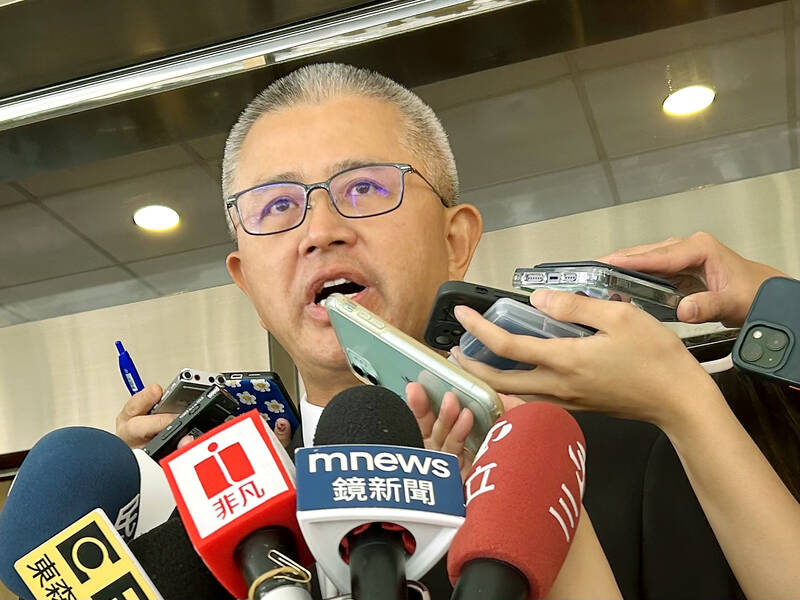Activist shareholders won the majority of board seats at Shin Kong Financial Holding Co (新光金控) on Friday, ending decades of control by founder and former chairman Eugene Wu (吳東進).
Activist shareholders led by the company’s former board director Hung Shih-chi (洪士琪) won 10 of 15 seats on the 21-year-old company’s board.
Among the 10 seats, eight are directors — including former Chang Hwa Bank (彰化銀行) chairman and former Taishin Financial Holding Co (台新金控) president Julius Chen (陳淮舟), former KGI Bank (凱基銀行) chairman Mark Wei (魏寶生) and Hung — and two are independent directors.

Photo: Wu Hsin-tien, Taipei Times
Chen was later elected as Shin Kong Financial chairman.
Eugene Wu and his allies gained five seats on the company’s board: his daughter, Shin Kong Financial president Olivia Wu (吳欣儒); Shin Kong Commercial Bank (新光銀行) chairman Lee Tseng-chang (李增昌); and MasterLink Securities Co (元富證券) chairman Joey Chen (陳俊宏).
About 85 percent of shareholders cast votes in the board election, the company said.
“Today marks a milestone for Shin Kong Financial as we make the first step toward reform,” Hung told reporters after the annual shareholders’ meeting in Taipei.
Hung had been critical about Shin Kong Financial’s operations, saying that the company’s share price was much lower than its book value.
However, he praised the company’s management team, including Olivia Wu and former chairman Victor Hsu (許澎), saying that they had worked hard over the past three years.
Eugene Wu urged all newly elected board directors to work together and make decisions in the interest of all shareholders, “especially regarding possible mergers and acquisitions in the future,” he said in a statement.
Eugene Wu said that he regretted the outcome of the election, but did not find it surprising.
He would not be adjusting his stake in Shin Kong Financial, he said, adding that the board directors nominated by him would continue to support the company.

Taiwan Semiconductor Manufacturing Co (TSMC, 台積電) would not produce its most advanced technologies in the US next year, Minister of Economic Affairs J.W. Kuo (郭智輝) said yesterday. Kuo made the comment during an appearance at the legislature, hours after the chipmaker announced that it would invest an additional US$100 billion to expand its manufacturing operations in the US. Asked by Taiwan People’s Party Legislator-at-large Chang Chi-kai (張啟楷) if TSMC would allow its most advanced technologies, the yet-to-be-released 2-nanometer and 1.6-nanometer processes, to go to the US in the near term, Kuo denied it. TSMC recently opened its first US factory, which produces 4-nanometer

GREAT SUCCESS: Republican Senator Todd Young expressed surprise at Trump’s comments and said he expects the administration to keep the program running US lawmakers who helped secure billions of dollars in subsidies for domestic semiconductor manufacturing rejected US President Donald Trump’s call to revoke the 2022 CHIPS and Science Act, signaling that any repeal effort in the US Congress would fall short. US Senate Minority Leader Chuck Schumer, who negotiated the law, on Wednesday said that Trump’s demand would fail, while a top Republican proponent, US Senator Todd Young, expressed surprise at the president’s comments and said he expects the administration to keep the program running. The CHIPS Act is “essential for America leading the world in tech, leading the world in AI [artificial

REACTIONS: While most analysts were positive about TSMC’s investment, one said the US expansion could disrupt the company’s supply-demand balance Taiwan Semiconductor Manufacturing Co’s (TSMC, 台積電) new US$100 billion investment in the US would exert a positive effect on the chipmaker’s revenue in the medium term on the back of booming artificial intelligence (AI) chip demand from US chip designers, an International Data Corp (IDC) analyst said yesterday. “This is good for TSMC in terms of business expansion, as its major clients for advanced chips are US chip designers,” IDC senior semiconductor research manager Galen Zeng (曾冠瑋) said by telephone yesterday. “Besides, those US companies all consider supply chain resilience a business imperative,” Zeng said. That meant local supply would

Servers that might contain artificial intelligence (AI)-powering Nvidia Corp chips shipped from the US to Singapore ended up in Malaysia, but their actual final destination remains a mystery, Singaporean Minister for Home Affairs and Law K Shanmugam said yesterday. The US is cracking down on exports of advanced semiconductors to China, seeking to retain a competitive edge over the technology. However, Bloomberg News reported in late January that US officials were probing whether Chinese AI firm DeepSeek (深度求索) bought advanced Nvidia semiconductors through third parties in Singapore, skirting Washington’s restrictions. Shanmugam said the route of the chips emerged in the course of an